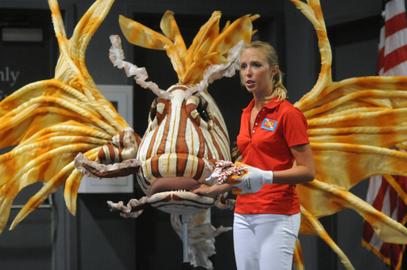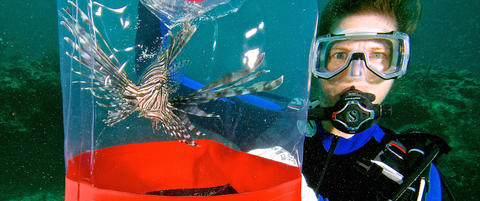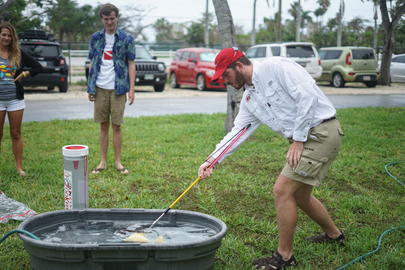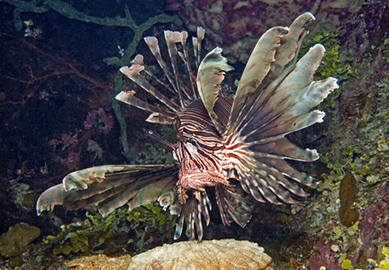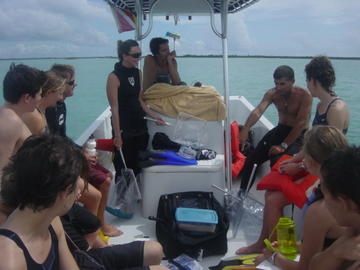As part of our efforts to address the lionfish invasion to the western Atlantic, REEF received a grant from the US Fish and Wildlife Service Aquatic Invasive Species Program to organize and lead lionfish workshops throughout the Southeast United States. Between August and October, REEF staff Keri Kenning and Lad Akins will be traveling to more than a dozen coastal communities to present information on the lionfish invasion and hands-on demonstrations on collecting and handling.
Current search
Search found 714 items
- lionfish
A new scientific paper with results from REEF's Invasive Species Program research was recently published in the journal Conservation Science and Practice. The findings shed light on the factors affecting invasive lionfish intervention success and efficiency and how to best incorporate these findings into local management for invasive species. As part of a multi-year study with funding from NOAA Coral Reef Conservation Program and others, REEF and partners coordinated regional efforts by divers to cull invasive lionfish on 33 U.S.
REEF is offering a series of free Lionfish Collection and Handling Workshops throughout south Florida and the Keys. Each workshop will include a classroom session covering the background of the invasion, lionfish biology, ecological impacts, current research, collecting and handling techniques, and other ways you can get involved. Attendees can obtain a permit to collect lionfish within the Sanctuary Preservation Areas (SPAs) in the Florida Keys National Marine Sanctuary using hand nets only.
Designing effective local management for invasive species poses a major challenge for conservation, yet factors affecting intervention success and efficiency are rarely evaluated and incorporated into practice. As part of a multi-year study with funding from NOAA Coral Reef Conservation Program and others, REEF and partners coordinated regional efforts by divers to cull invasive lionfish (Pterois spp.) on 33 U.S. Atlantic, Gulf of Mexico, and Caribbean protected coral reefs from 2013 to 2019.
Text by Erin Spencer, Photos courtesy of Lad Akins
A recent study published in Ecology and Evolution offers a new approach to traditional mark and recapture studies while providing valuable insight into the growth and movement patterns of invasive lionfish. Lad Akins, Dr. James Morris, and Dr. Stephanie Green teamed up to develop a novel way of visually tagging fish underwater, minimizing both tagging time and fish trauma.
In response to the growing threat of lionfish in the Atlantic and the need for coordinated planning, REEF, NOAA and the USGS are hosting a technical workshop on Non-native Marine Fish Introductions of South Florida in the Florida Keys June 18 and 19. The workshop, jointly funded through a recent Mote Marine Laboratory’s Protect Our Reefs grant, NOAA’s Exotic Species and National Marine Sanctuary Programs and the Gulf and Atlantic States Regional Panel on Aquatic Invasive Species,will bring together personnel from more than 18 different agencies and organizations.
Following the most recent Indo-Pacific Lionfish expedition at Stuart Cove’s in Nassau, Bahamas, we kicked off the next phase of our critical research on this invasive species in Eleuthera. Supporters, Trish and David Ferguson, served as hosts for the week. Earlier this summer, REEF staff set up 11 study sites, tagging 30 fish on six different patch reef and clearing the other 5 sites of lionfish. This past week, I revisited those tagging sites and documented any movement of lionfish.
Information on fish movement and growth is primarily obtained through the marking and tracking of individuals with external tags, which are usually affixed to anesthetized individuals at the surface. However, the quantity and quality of data obtained by this method is often limited by small sample sizes owing to the time associated with the tagging process, high rates of tagging-related mortality, and displacement of tagged individuals from the initial capture location.
$2,620 per person double occupancy. Includes: lodging for 7 nights onboard the Aqua Cat luxury liveaboard in an ocean view cabin, all meals and drinks, up to 5 dives per day for 6 days and 2 dives on the last day of diving, and r/t ground transportation from Nassau Airport.
+$200 REEF Program Fee per diver will be added to each package to cover the cost of the group leader, seminar and survey materials.

